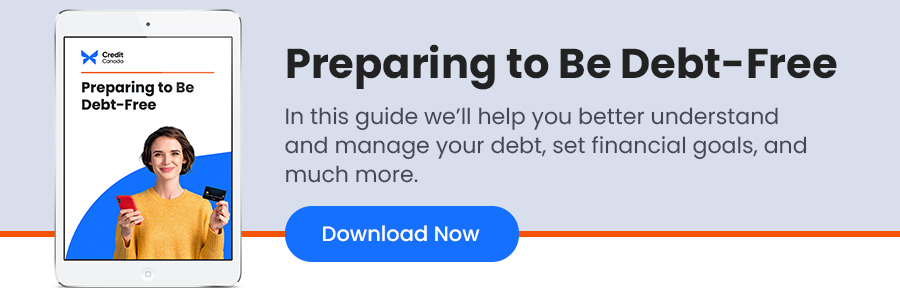
We know the stats. Divorce is one of the most significant financial events you can endure. And in many cases, it could deplete you financially.
Divorce costs between $15,000 to $100,000 on average. And if you don’t have that kind of coin? You’ll either be forced to sell assets or take out more debt. Pair that with the fact that debt (more broadly, money) is one of the largest causes of divorce in the first place.
How do you mitigate the immense legal fees that come after divorce? Or how do you deal with the joint credit card your spouse never shared with you? Not to mention the financial stress of going from a two-income to a one-income household with children, no less!
The good news is that you aren’t alone and have support. Here at Credit Canada, we’ve supported countless Canadians navigating debt before, during, and after divorce. Still, it’s normal to feel nervous at the daunting task.
Today, we’ll answer all your divorce-debt questions and discuss how to best prepare for debts after divorce.
How the Courts See Debts in Divorce
Marriage merges your assets, savings, and debts, too. But that doesn’t necessarily mean you’re 50/50 responsible for every single balance. Here are some things the courts consider before ruling on divorce divisions (that is if a couple cannot sort the debt on their own):
- Length of relationship: It’s unlikely a short, two-year marriage would force one spouse to take on the other’s lifetime of debt.
- Names on debt accounts: Shared accounts are considered the responsibility of both spouses. If only one spouse is named on a credit account, creditors can only pursue that spouse. Still, it’s fair game when it comes time to split assets and debts.
- Value of debt compared to property: Secured debt might force couples to sell the asset in question.
- Income for both spouses: If you have a big income disparity with your spouse, you might be on the hook for greater responsibility in repayment.
- Debt updates following separation or divorce: If one spouse added more debt to an account after separation, the courts might relieve the other of the responsibility.
5 Steps to Take to Prepare for Debt After Divorce
1. Check your credit report first
Both you and your spouse should check your credit score and accompanying reports. We recommend ordering credit reports from both Equifax and TransUnion, so you don’t miss any potential accounts. You might notice various loan types like:
- Mortgages
- Credit cards
- Student loans
- Car loans
- Personal or business loans
Hopefully, you’ll already be aware of each account. However, some marriages see surprise accounts upon divorce. Notice anything new? If the debt is under your spouse’s name, usually they’ll be responsible for paying it. But if you see anything under your name that you don’t recognize? You might seek support from a legal professional or licensed insolvency trustee.
2. Address joint accounts
If both your names are on an account, you’re both equally responsible — no matter what your separation agreement says. If you don’t want to have that responsibility, we recommend closing those accounts.
For credit cards, you might even remove one spouse as an authorized user. This is a better option if you can swing it, since too many closed credit accounts can lower your credit score.
Consider joint bank accounts as well. Both names mean both parties can access the funds. You could either close the account or remove one spouse from the account.
Some couples might prefer to maintain joint accounts even after divorce. This is especially common when kids or college are in the picture, or if both are still responsible for a mortgage. Most banks allow you to implement access barriers, like two signature requirements for withdrawals. Still, consult a lawyer if you decide to maintain joint accounts.
3. Revise wills and beneficiaries
You might adjust your will upon divorce — but your ex can still inherit some of your assets regardless. How? Beneficiaries for certain investments might still apply despite a will. That’s why it’s vital to change beneficiaries for registered investment accounts, as advised by RBC.
Similar stipulations apply to pension plans. For example, your spouse is automatically your pension beneficiary in BC if you’re together for at least two years. And if you separate after retirement, you might need a signed waiver from your spouse to remove them as a pension beneficiary. If you cannot agree on this particular asset, you might seek counsel from a lawyer.
Overall, you should review beneficiary information for any of the following accounts or assets:
- Pension plans, including employer-sponsored pension plans, Quebec Pension Plan (QPP), and Canada Pension Plan (CPP)
- Life insurance
- Bank accounts
- Death benefit and inheritances
- Registered Retirement Savings Plans (RRSPs)
- Tax-Free Savings Accounts (TFSAs)
- Pooled Registered Pension Plans (PRPP)
- Registered Retirement Income Funds (RRIFs)
A note on life insurance: While it might feel natural to remove the other from your policy, both spouses should always consider child support. For example, you might want to stipulate a clause that child support payments remain protected in the event of death.
4. Keep making minimum payments
The average Canadian divorce takes 4-6 months to settle. But if you and your spouse don’t see eye to eye, litigation could take years.
That’s a long time to still share debts.
It might feel frustrating to keep making minimum payments on debts you feel don’t belong to you. However, if your name is attached, you risk tanking your credit score if you avoid paying the debts. At the least, maintain minimum payments on shared debts throughout your divorce.
5. Try your best to stay amicable
Divorce is one of the most expensive events you could experience. The longer it takes, the more you might spend on legal fees.
Experts have seen divorce costs rise as high as $250,000. If you find yourself in this position, you might be forced to take on second mortgages or large, high-interest loans to afford the divorce, meaning even more debt for you down the line.
You might start the process with a mediator to keep things amicable. Of course, we recognize this can’t always be possible. It’s just worth noting, though, that nasty divorces can result in more debt.
Find Debt Relief After Divorce with Credit Canada
In a perfect world, people could settle debts and assets amicably in any separation or divorce. Unfortunately, it’s not a realistic way to prepare.
Still, you don’t have to tackle debt after divorce alone. Our certified credit counsellors have decades of combined experience supporting Canadians like yourself with debt in almost every situation. If you’re experiencing financial insecurity and overwhelming debt during or after divorce, you have options.
We can walk you through some strategies to mitigate your debt at absolutely no cost to you. And when all else fails, we can walk you through how to move forward after debt consolidation, consumer proposals, and bankruptcy.
Contact one of our credit counsellors today for a free consultation.

Frequently Asked Questions
Have a question? We are here to help.
What is a Debt Consolidation Program?
A Debt Consolidation Program (DCP) is an arrangement made between your creditors and a non-profit credit counselling agency. Working with a reputable, non-profit credit counselling agency means a certified Credit Counsellor will negotiate with your creditors on your behalf to drop the interest on your unsecured debts, while also rounding up all your unsecured debts into a single, lower monthly payment. In Canada’s provinces, such as Ontario, these debt payment programs lead to faster debt relief!
Can I enter a Debt Consolidation Program with bad credit?
Yes, you can sign up for a DCP even if you have bad credit. Your credit score will not impact your ability to get debt help through a DCP. Bad credit can, however, impact your ability to get a debt consolidation loan.
Do I have to give up my credit cards in a Debt Consolidation Program?
Will Debt Consolidation hurt my credit score?
Most people entering a DCP already have a low credit score. While a DCP could lower your credit score at first, in the long run, if you keep up with the program and make your monthly payments on time as agreed, your credit score will eventually improve.
Can you get out of a Debt Consolidation Program?
Anyone who signs up for a DCP must sign an agreement; however, it's completely voluntary and any time a client wants to leave the Program they can. Once a client has left the Program, they will have to deal with their creditors and collectors directly, and if their Counsellor negotiated interest relief and lower monthly payments, in most cases, these would no longer be an option for the client.







